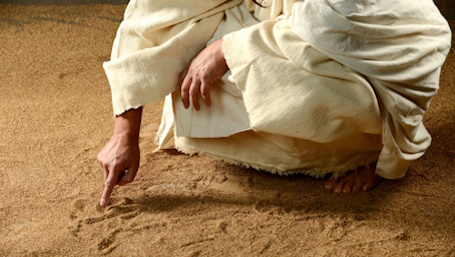TuesdayReflection
7th November 2023
David Guzik offers thoughts on
************************
A woman caught in adultery is brought to Jesus for judgment.
The Bible speaks often of God's strength in our weaknesses.
Jesus went to the Mount of Olives.
Now early in the morning He came again into the temple, and all the people came to Him; and He sat down and taught them.
Augustine and Ambrose omitted this story, not so much because of the textual evidence but because they thought it made Jesus appear to approve of sexual immorality, or at least not regard it as serious.
We have good reason to believe that this actually happened, and that John really wrote this.
There is some debate as to where it belongs in the Gospel accounts, but there is good reason to believe it belongs.
Then the scribes and Pharisees brought to Him a woman caught in adultery.
And when they had set her in the midst, they said to Him, "Teacher, this woman was caught in adultery, in the very act.
Now Moses, in the law, commanded us that such should be stoned. But what do You say?"
"All the indications are that her accusers had some special vindictiveness against her.
This is shown also in the fact that they brought the woman along publicly... There was no need for this. She might have been kept in custody while the case was referred to Jesus."
To mention the obvious, there was also a man involved in this very act of adultery - yet the guilty man was not brought before Jesus for judgment.
It also meant that there were pre-arranged spies sent to witness this affair, and they carefully noted the sordid details.
The conditions the obtaining of evidence in adultery would be almost impossible were the situation not a setup."
Moses, in the law, commanded us that such should be stoned:
It is true that adultery was a capital offense under Jewish law, but the rules for evidence in capital cases were extremely strict.
The actual act had to be observed by multiple witnesses who agreed exactly in their testimony.
As a practical matter, virtually no one was executed for adultery, since this was a relatively private sin.
They set a trap for Jesus.
If Jesus said, "Let her go," then He would seem to break the Law of Moses.
If He said, "Execute her for the crime of adultery," then Jesus would seem harsh and perhaps cruel.
Also, He would break Roman law, because the Romans had taken the right of official execution for religious offenses away from the Jews.
They cared nothing for true righteousness, for it was evident that they carefully arranged both the adulterous act and her arrest.
It's possible that the man was one of them, and they simply used the woman as a weapon or pawn in their conflict against Jesus.
Jesus stooped down and wrote on the ground with His finger:
This was a careful and deliberate response from Jesus.
Instead of making an immediate verbal response He stooped down.
Then He wrote on the ground with His finger.
So when they continued asking Him, He raised Himself up and said to them,
"He who is without sin among you, let him throw a stone at her first."
And again He stooped down and wrote on the ground.
In Jewish law, witnesses to the capital crime began the stoning.
Jesus really said, "We may execute her, but we must do it correctly.
One of the witnesses must begin her execution.
So who among you is the one who witnessed this crime, and only brought to Me the woman, not the man?
Who designed the humiliation of this poor woman?"
It wasn't that these men had sinned once or twice before, and so had no right to be concerned about the woman's sin.
It's that they orchestrated and plotted her sin, her shame, using her as a weapon against Jesus.
In this direct incident they had a greater sin and a greater guilt.
In this Jesus exposed a common sin:
a desire to punish the sins of others, while ignoring our own sin.
Then those who heard it, being convicted by their conscience, went out one by one,
beginning with the oldest even to the last.
And Jesus was left alone, and the woman standing in the midst.
It spoke well of these men that their conscience was not dead or burned over.
They still could be convicted by their conscience.
They were now more aware of their own sin than the sin of the woman.
When Jesus had raised Himself up and saw no one but the woman, He said to her,
"Woman, where are those accusers of yours?
Has no one condemned you?"
She said, "No one, Lord."
And Jesus said to her,
"Neither do I condemn you; go and sin no more."
The woman needed hope because the consequences of her sin would be severe enough.
After this she would likely be shunned by her community, and rejected by her husband,
perhaps even divorced (assuming she was married or betrothed).
Un-edited version, (MUCH MORE) available on request
David Guzik
When David Guzik was a young pastor in Simi Valley, California, he (among many other pastors) was asked to send his teaching notes to the developers of a new internet Bible research site: Blue Letter Bible.
In the late 1990's, David's material first appeared on the Blue Letter Bible, and was found to be a valuable resource.


